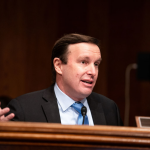One of D.C.’s most prominent lobbying firms has signed on to help the much criticized Saudi-funded LIV Golf league navigate its way through Congress.
But it’s not registering as a foreign agent. Akin Gump Strauss & Feld is representing the sovereign wealth fund of Saudi Arabia, amid a congressional probe into LIV Golf. Raphael Prober, a lawyer at the firm, wrote to Sen. Richard Blumenthal (D-Conn.) on behalf of the Saudi’s Public Investment Fund (PIF), arguing that the governor of the fund “cannot participate in any public hearing that is part of an unbounded inquiry into the PIF’s past, present, and future interests and investments.”
Blumenthal, who chairs the Senate’s Permanent Subcommittee on Investigations, has requested testimony from PIF governor Yasir Al-Rumayyan since June.
“An unprecedented effort by the Subcommittee to compel [Al-Rumayyan’s] appearance and testimony would not only disrupt the delicate balance of foreign relations and international diplomacy, but would also compromise the prerogatives of the Executive Branch,” Prober wrote in the letter.
Prober, a partner at Akin Gump, co-heads the firm’s congressional investigations division.
His letter, dated Aug. 23 but filed with the Justice Department on Aug. 30, is the latest volley in PIF’s back-and-forth with Blumenthal’s subcommittee over Al-Rumayyan’s potential testimony, as part of an inquiry into the wealth fund’s U.S. investments. The subcommittee launched a probe after the announcement in June that the PIF-financed LIV Golf league and PGA Tour planned to join forces after months of bitter infighting between the two ventures.
Prober’s letter notes that he has been in contact with the subcommittee as early as June 28. It also notes that the PIF is open to briefing the committee and providing information from “an appropriate representative of the PIF at the Subcommittee’s convenience.” It notes that no deal has been formally reached regarding the negotiations between the PIF and the PGA Tour.
Prober expressed some concern with the fact that Blumenthal’s investigation delves into all of the PIF’s U.S. investments. He suggested that some of the information sought by the congressional inquiry is subject to immunity for a foreign official.
“[T]he information requested is subject to multiple Saudi laws protecting its confidentiality, very much akin to laws protecting the sensitive information and deliberative processes of the United States government and its instrumentalities,” Prober wrote.
The letter was filed with the Department of Justice under Foreign Agents Registration Act by a different firm working on behalf of the PIF: Brownstein Hyatt Farber Schreck. That firm told the Department of Justice in June that it was helping the PIF with “Education and advocacy before the U.S. federal government involving Public Investment Fund transactions,” according to a filing.
Akin Gump itself is not registered under FARA as a lobbyist for the PIF. A spokesperson for the firm said it is “mindful of and complies with obligations under FARA, and we will continue to do so. The statute provides clear guidance that a lawyer is able to provide legal services in response to investigations.”
While there does exist a legal exemption to FARA for lawyers who represent a foreign principal before the U.S. government, Ben Freeman, Director of the Democratizing Foreign Policy program at the Quincy Institute for Responsible Statecraft, questioned whether Akin Gump’s work would fall under that categorization.
“I don’t understand how anybody lobbying on behalf of the Saudi Public Investment Fund wouldn’t register under FARA,” Freeman said. “We’re talking about an entity that we know is run by the Saudi government. This is a sovereign wealth fund.”
Josh Rosenstein, a lawyer specializing in FARA at Sandler Reiff Lamb Rosenstein & Birkenstock, also expressed some skepticism that the legal exemption would apply to Akin Gump in the congressional investigation. He said that Akin Gump would have to tread carefully regarding the scope of their work and would be wise to obtain an advisory opinion from DOJ.
“The traditional notion is that it stops at the courthouse steps,” Rosenstein said, of the legal exemption.
















